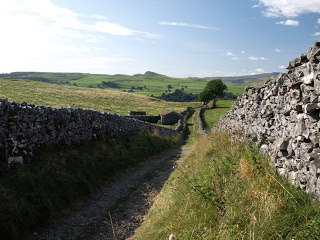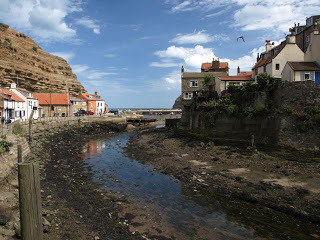Stuart Aken's Blog, page 287
October 5, 2011
Stuart's Daily Word Spot: Kamikaze
 Image via Wikipedia
Image via WikipediaKamikaze: noun - in Japanese tradition, this is thegale that destroyed the fleet of the invading Mongols in 1281; during theSecond World War, it came to represent both the crewman of a Japanese aircraft andthe plane itself. Usually loaded with explosives, these made deliberatesuicidal attacks, crashing into enemy targets; a suicide pilot or plane; in surfing- a wipeout taken deliberately.
'I tell you, I could seethe mad eyes of that Kamikaze pilot as he aimed his fighter at the bridge ofour destroyer. It was only Johnnie's accurate anti-aircraft fire that saved usand blew the bugger up before he could crash into us.'
5 October 1936 And 200 menset out from Jarrow in the north east of England to march to London and bringthe poverty of their region to the attention of the politicians in Whitehall.

Published on October 05, 2011 02:00
October 4, 2011
Stuart's Daily Word Spot: Tortuous or torturous?
 Image via Wikipedia
Image via WikipediaTortuous or torturous? Tortuous: adjective - full of twists or turns; twisted, sinuousor winding; not direct or straightforward; devious, circuitous.
Torturous: adjective - characterized by or involving torture; tormenting,excruciating; figuratively - violently twisted or distorted; perverted.
The use of 'torturous' in place of'tortuous', although more common these days, is the result of amisunderstanding of the real meanings of these two words and should be avoided.
'Thedelta of the Mississippi is full of tortuous distributaries, carrying thewaters over the flat land to the sea.'
'Thetattoo on Jodisa's leg led a tortuous path from her ankle to the place all mendesired to enter.' (That's a reference to the epic fantasy I'm writing.)
'ForSandra, being with Michael was a torturous experience, making her wince withhis every advance and clumsy fumble.'
'Theinmates of the foreign prison were subject to torturous treatment, which leftmany of them unable to stand unaided.'
Atortuous experience winds around; a torturous one causes pain.
4 October 1911 If you usethe London Underground and travel via Earls Court, you might like to know thefirst escalator opened there and is now 100 years old. I suspect they'veupdated it since it was first installed, though.

Published on October 04, 2011 01:00
October 3, 2011
Stuart's Daily Word Spot: Jackanapes
 Jackanapes: noun - a tame ape or monkey; someone whodisplays qualities or behaviour associated with apes; a ridiculous upstart orimpertinent person; a cheeky child.
Jackanapes: noun - a tame ape or monkey; someone whodisplays qualities or behaviour associated with apes; a ridiculous upstart orimpertinent person; a cheeky child. 'Johnson ran up to theboss, tweaked his nose and kissed him on his bald pate, acting like ajackanapes.'
Pic: Drovers' track in the Yorkshire Dales.
Published on October 03, 2011 00:00
October 1, 2011
Stuart's Daily Word Spot: There, they're or their?
 There, they're or their?
There, they're or their?More homonyms that constantly causeconfusion. Hopefully these suggestions will help keep you on the right trackwith them.
'There' is about the location ofsomething, as in 'It's over there.' Oneway to remember this is as follows:'t(Here) for coffee, there fort(ea).'
'They're' is a contraction of'they are'. 'Beware if they're too pleasant;they're probably after your money.' If you can use the full phrase,'they are' in the sentence, then 'they're ' is the suitable word.
'Their' is the plural pronoun thatequates with 'mine' – both have an 'i', which will hopefully act as a reminder.'Their dresses are too short, butmine is just the right length.'
Pic: Looking toward Huggate, East Yorkshire.

Published on October 01, 2011 23:00
September 30, 2011
Stuart's Daily Word Spot: Ice
 Ice: noun - frozen water, which is a brittle translucent crystallinesolid; a body of such frozen water; the sheet or layer of ice on a pond, river,etc; figuratively – a lack of warm feeling, cold-heartedness, deep reserve; anice cream; the icing on a cake; diamonds and other jewellery (slang); the profit made from illegalsales of theatre or cinema tickets (USslang); protection money (slang).
Ice: noun - frozen water, which is a brittle translucent crystallinesolid; a body of such frozen water; the sheet or layer of ice on a pond, river,etc; figuratively – a lack of warm feeling, cold-heartedness, deep reserve; anice cream; the icing on a cake; diamonds and other jewellery (slang); the profit made from illegalsales of theatre or cinema tickets (USslang); protection money (slang).'Donald took his vanilla iceonto the frozen puddle, which was now solid and allowed him to skate on the surfaceof ice.'
'When Gordon made hissuggestion to her, Deidre replied with a glance that exposed the ice in herheart and he knew he'd spend the night in the guest room again.'
'Marylyn counted thecrystals of ice that poured from the soft leather bag, handed her by her agedbut hideously rich admirer, before she calculated how she'd reward him.'
Pic: Bridlington Bay.
Published on September 30, 2011 22:00
Stuart's Daily Word Spot: Habitual
 Habitual: adjective - inherent or latent in themental constitution; of the nature of or fixed by a habit; constantly repeatedor continued; customary; given to a specific habit; usual, constant, continual.
Habitual: adjective - inherent or latent in themental constitution; of the nature of or fixed by a habit; constantly repeatedor continued; customary; given to a specific habit; usual, constant, continual.'Jennifer wore herhabitual gown of gossamer over skin that was tanned by habitual worship of thesun.'
'Long custom, combinedwith ignorance, intolerance and prejudicial fear made the torture and demonizationof pagan women habitual at the hands of the religious authorities.'
30 September 1861 WilliamWrigley, who founded Wrigley's Chewing Gum Company, was born. Those who blamethe producer for the sins of the users might wish to curse him for the stickymess his products leave on our streets and elsewhere.
Pic: The beck at Staithes, North Yorkshire.

Published on September 30, 2011 09:00
September 29, 2011
Author Interview with Jeff Horton.
 Hello Jeff, please tell us aboutyou, as a writer.
Hello Jeff, please tell us aboutyou, as a writer.Well, I started writing several years ago, when I was at thepoint in my life that I wanted to reinvent myself. I started putting one wordin front of enough until a novel appeared. I enjoy writing a variety of fiction, ranging from pre andpost-apocalyptic stories, to children's stories and cyber-warfare. The GreatCollapse-Survivors of the Pulse, which came out in 2010, was the first in theSurvivors of the Pulse series, a story about the collapse of civilization whenelectricity is lost across the planet, permanently. The series concludes in TheDark Age-Survivors of the Pulse, which is set five-hundred years in the future,when men once more depend on swords, bows, and arrows to survive. My lastnovel, The Last Prophet, is a fictional story based on the book of Revelationin the Bible, and is written in the first person from the perspective of theprophet. Your latest books are The Dark Ageand The Last Prophet; perhaps you'd you give us some insight into it in a fewsentences?
The Dark Age and The Last Prophet were released within twoweeks of one another. The Dark Age is a post-apocalyptic novel in whichhumanity struggles to rebuild civilization and break free from five-hundreds ofdarkness. The Last Prophet is a story set at the end of days, when a man namedJohn March, is called to proclaim that the end of the world is at hand, and towarn mankind about the Beast.
How did you come to write thisparticular book?
Although it was the second of my three novels to bepublished, The Dark Age was written first. I've always wondered what wehumanity would do without it's vast and increasingly complex technology. In TheDark Age, not only must humanity live without modern technology, they must livewithout the benefit of thousands of years of ancient technology as well, sinceit was also lost when civilization fell apart during The Great Collapse. In regards to The Last Prophet, I have always wanted towrite a book based on the book of Revelation. There is such rich imagery andfantastic characters that I felt it was worth writing another novel about. Thistime however, I wrote it from the perspective of the prophet, a weak andfallible man who, like the rest of us, is riddled with self-doubt.
Do you have a favouritecharacter from the book? If so, who and why this particular one?
Ihave several characters I really like in each book. My favorite character in The Dark Age would probably be theprotagonist, Ferrell Young, and the antagonist, Kraken. The story would not bequite what it is without either.With The Last Prophet, I'd have to say that oneof myfavorite characters was the wife of John March,Lara. She was always supportive of her husband throughout his journey, anddemonstrates just how strong she is when he dies.
Where can people buy yourbooks?
The Dark Age and The Last Prophet are available from thepublisher, Amazon, and most major bookstores. MyPublisher's website-World Castle PublishingTheDark Age on AmazonTheLast Prophet on Amazon
What qualities does awriter need to be successful?
I think there are three qualities that a writer must possessto be successful; imagination, belief in oneself, and a thick skin. First, anovelist must have an imagination that create a world replete with fictitiousplaces, people, and events. Second, a writer must be confident enough andbelieve in oneself enough to carry them through when naysayers, including thoseclosest to them, try to dissuade them (often with good intentions), frompursuing their dream of a writing career. Lastly, a successful writer must bethick-skinned enough that when their work is slammed by critics (which it willbe), they do not fold and abandon their dream.
What's your working method?
I tend to start with a rough idea of a story. Then, as Iwrite more the plot and the characters begin to develop. Then I start todevelop more of a formal outline that helps build more structure for theremainder of the book.
What's the single biggestmistake made by beginner writers?
I don't honestly know. From my own mistakes, I can say thatI was way too naïve about the challenges around getting published. I was evenmore naïve about the amount of marketing that would be necessary to sell books.Like many others, I'm still waiting to see how successful my efforts will be.
To what extent are grammarand spelling important in writing?
I look like grammar and spelling as necessary evils. Theyhave little to do with developing and telling an exciting story, but you cannotdo so without them. While they do not make a book a bestseller, poor spelling andgrammar certainly can sink one.
How much do you revise yourMS before sending it off?
At first it was nowhere nearly as polished as it should havebeen. Now, I try to get it as polished as I can before sending it in. It's alot easier to make changes before it enters the editing process.
As a writer of Christianfiction, to what extent do you think genre is useful in the publishing world?
I think the genreis far too underappreciated. I believe that human beings seem to have an innateinterest in the supernatural, but I believe that the market has been saturatedwith the Twilights and Harry Potters for the last five to ten years. Regardless, Ibelieve that if I can write good, quality, entertaining Christian fiction,there is a huge market for it.
Many authors see marketingas a bind. What's your opinion on this, and how do you deal with it?
I can certainly understand and appreciate that many authors don'tlike the marketing side and to be honest, I'm not sure we are the mostqualified. Until we achieve some substantial recognition however, it is up tous or the publisher to market the author andthe book.
What sort of displacementactivities keep you from writing?
Myday job. For the time being, I do most of my writing at night and on weekends.
What support, if any, doyou receive from family and friends, writing group, or dedicated professionals?
My family and friends have been very important, particularlywhen I first launched my writing career. I continue to have significant supportfrom both, which I appreciate very much.
Is presentation of the MSas important as agents and publishers suggest?
Absolutely. As with grammar and spelling, it doesn't makethe book successful, it keep it from getting published.
How long does it take youto write a novel?
That largely depends on how much time I have available toput into it. Typically it takes from six months to a year.
Who or what inspires yourwriting?
God, Life, both…I don't really know for sure. Subject matterthat I am either familiar with or have an interest in is important.
If there's a single aspect ofwriting you find frustrating, what is it?
With me it's the dotting of the "i" and the crossing of the "t" that comes oncethe rough draft is finished that is the most frustrating, that and themarketing.
Is there a particular featureof writing that you really enjoy?
I really enjoy the pure creativity of the writing process.As an author, I get to create a world, populate it with people and places, whatcould be more fun then that?
Do you believe creative writingis a natural gift or an acquired skill?
Both. While people are sometimes born with an innatecreativity, it takes time and practice to develop as an artist.
What are you writing now?
My current project is children's novel, a mixture ofChronicles of Narnia, Pilgrim's Progress, and science-fiction.
Do you have a website orblog where readers can visit?
Yes.I am listing them below. AuthorJeff Horton's website- www.hortonlibrary.com Goodreads- http://www.goodreads.com/author/show/... Facebook- http://www.facebook.com/Author.Jeff.H...
Given unlimited resources,where would you do your writing?
Sometimesoutside by the pool, sometimes on a yacht, other times in a quiet study.
Where do you actuallywrite?
In my living room, believe it or not.

Published on September 29, 2011 08:30
Stuart's Daily Word Spot: Then or than?
 Then or than?
Then or than?Although it's quite commonfor these two to be confused, it's one of those that is simple to resolve.'Then' has to do with thepassage of time, or with a sequence of events.'Than' is a comparativeconjunction, allowing one thing to be compared with another.
So:
'Sarah went to see hermother, then travelled the short distance to see her brother, and then she wentto the supermarket and met the man of her dreams over the cheese counter.'
'Sarah has more than onesister; in fact, she has three.'
'If you don't stop that,Bernard, then I'll slap your face.' (though, in fact, the 'then' in thissentence is redundant – try it without and you'll see there's no loss ofmeaning. But it illustrates the point, I think.)
'I'd rather you kissed methan slapped my face.'
Pic: Suspension bridge over the Humber Estuary.

Published on September 29, 2011 06:30
September 28, 2011
Stuart's Daily Word Spot: Gadabout
 Gadabout: adjective - Gadding, roving. noun -someone who gads about.
Gadabout: adjective - Gadding, roving. noun -someone who gads about. 'That Bryan has a rightgadabout eye; always looking over the talent as the girls come into the club.'
'Young Shiela's a realgadabout; roams all over the place like a nomad.'
Pic: Sunset over Sissi harbour, Crete.

Published on September 28, 2011 06:30
September 27, 2011
Stuart's Daily Word Spot: That or which?
 Image via Wikipedia
Image via WikipediaThat or which?Much has been said and written about the usage of these two words and I couldspend paragraphs in explanation. However, for most purposes the followingillustration should suffice. I'll refer you to Fowler or your favouritegrammarian for a more detailed exposition.
'That' is used in a restrictive sense; i.e. it identifies one objectamong many, pointing out the item that has a specific characteristic. So, 'A mini-skirtthat is short…' tells the reader that you are referring to the one skirt,amongst the many, that is notable because of its lack of length. It's probablyworth pointing out here that there is no comma dividing the object from thedescription.
'Which', however, is used in a non-restrictive way; i.e. it points to asingle item possessing the specified quality. So, 'A mini-skirt, which isshort…' tells the reader that the skirt is short, without comparing it to anyother. Note also that the object and its description are separated by a comma.
So, to enlarge on the examples in a way that will hopefully illustratethe point more fully:
'A mini-skirt that is short is bound to draw more male eyes than amini-skirt of normal length.'
'A mini-skirt, which is always short, will cover very little of thelegs.'
In the first example, if the words 'that is short' are excluded thesentence has a different meaning. The restrictive clause 'that is short' iscrucial to the real meaning of the sentence.But, in the second example, if the words 'which is always short' aremissed out, the sentence means the same thing. The non-restrictive clause'which is always short' merely adds a bit of information to the sentencewithout altering its meaning.
Probably, therefore, the easiestway to remember when to use 'that and when 'which' is more appropriate, is todecide whether you could ditch the clause. You can ditch the 'which' but losethe 'that' and you'll look a prat.
27 September 1988 Imarried my wonderful wife, Valerie. We've been very happy ever since.27 September 1981 Thefirst TGV high speed train journey took place in France.

Published on September 27, 2011 06:30



